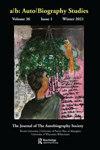自传体小说:女性法语审美的流放
Q1 Arts and Humanities
引用次数: 0
摘要
安东尼娅·温布什的研究《自传体小说:一种法语女性的流亡美学》,旨在分析和比较不少于六位当代女性作家(金·勒弗勒特、吉斯丽·皮诺、尼娜·布拉维、米歇尔·拉克托松、瓦姆萨罗尼克·塔乔和亚伯拉·法胡德)作品中对流亡的表现。结果是一篇写得非常好的分析,表达和论点都清晰得令人钦佩。它有助于越来越多的(用英语)研究用法语写作的生活。自传作为一种生活写作形式的流行概念以其法语起源而闻名,其在当代学术工作中的传播与菲利普·勒琼的工作和他的“自传契约”理论密切相关。相比之下,在其他语言中,包括法语等世界主要语言中,生活写作并不是一个简单的对等词。因此,温布什在法语和英语(从塞尔日·杜布鲁夫西到菲利普·加斯帕里尼再到阿诺·施密特)中对生活写作和自传(法语世界中最接近生活写作的术语)之间的细微差别进行的讨论特别引人入胜,也很有用温布什确实注意到,Hywel Dix(2018)推出了一个明显被认为是英语自述小说的语料库温布什研究的作者来自法语圈的不同地区,包括被充分研究的国家,如阿尔及利亚(布拉乌伊)和加勒比地区(皮瑙),以及在英语圈中不太为人所知的地区,如黎巴嫩(法胡德)和马达加斯加(拉科托松)。这个标题的广泛,包容的框架允许引用大量的作品本文章由计算机程序翻译,如有差异,请以英文原文为准。
Rev. of Autofiction: A Female Francophone Aesthetic of Exile
Antonia Wimbush’s study, Autofiction: A Female Francophone Aesthetic of Exile, aims to analyze and compare the representation of exile in the work of no fewer than six contemporary female authors (Kim Lefèvre, Gisèle Pineau, Nina Bouraoui, Michèle Rakotoson, Véronique Tadjo, and Abla Farhoud). The result is a very well-written analysis with an admirable clarity of expression and argument. It contributes to a growing number of studies (in English) of life writing in the French language. The popular notion of autobiography as a form of life writing is renowned for its francophone origins, and its propagation in contemporary academic work has been heavily associated with the work of Philippe Lejeune and his theorization of the “autobiographical pact.” By contrast, life writing is not a term that has a simple equivalent in other languages, including major world languages such as French. Thus, Wimbush’s discussion of the nuances that tie and separate life writing and autofiction—the term closest to life writing in the francophone world—in French and English (from Serge Dubrouvsy to Philippe Gasparini to Arnaud Schmitt) is especially beguiling and useful.1 Wimbush indeed notes that a corpus of work distinctly identified as autofiction in English has been unveiled by Hywel Dix (2018).2 The authors who Wimbush examines emanate from diverse areas of the Francosphere, including well-studied nations such as Algeria (Bouraoui) and the Caribbean (Pineau), and areas that are less well known in the Anglosphere, such as Lebanon (Farhoud) and Madagascar (Rakotoson). The broad, inclusive framework of this title allows ample Works Cited
求助全文
通过发布文献求助,成功后即可免费获取论文全文。
去求助
来源期刊

a/b: Auto/Biography Studies
Arts and Humanities-Literature and Literary Theory
CiteScore
0.80
自引率
0.00%
发文量
27
期刊介绍:
a /b: Auto/Biography Studies enjoys an international reputation for publishing the highest level of peer-reviewed scholarship in the fields of autobiography, biography, life narrative, and identity studies. a/b draws from a diverse community of global scholars to publish essays that further the scholarly discourse on historic and contemporary auto/biographical narratives. For over thirty years, the journal has pushed ongoing conversations in the field in new directions and charted an innovative path into interdisciplinary and multimodal narrative analysis. The journal accepts submissions of scholarly essays, review essays, and book reviews of critical and theoretical texts as well as proposals for special issues and essay clusters. Submissions are subject to initial appraisal by the editors, and, if found suitable for further consideration, to independent, anonymous peer review.
 求助内容:
求助内容: 应助结果提醒方式:
应助结果提醒方式:


